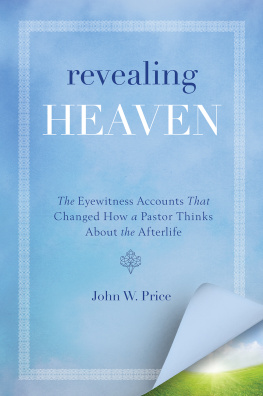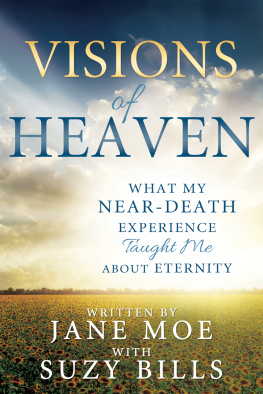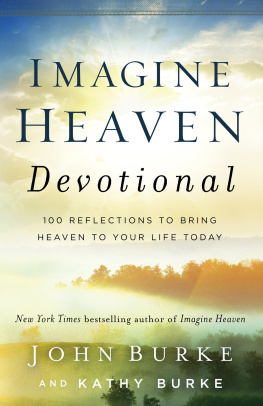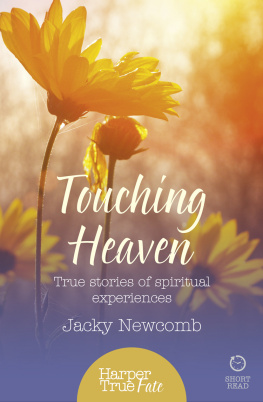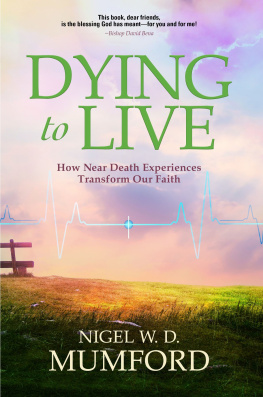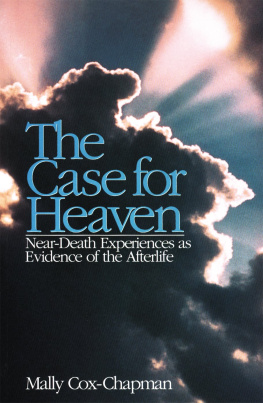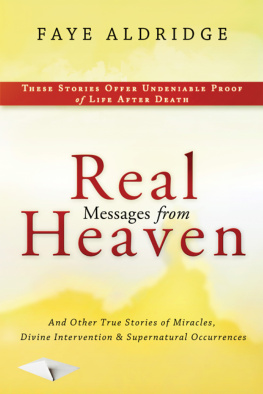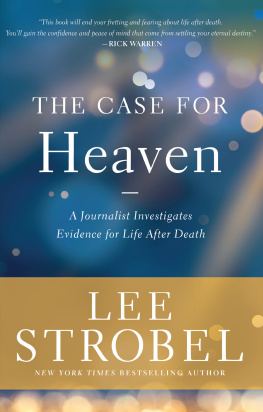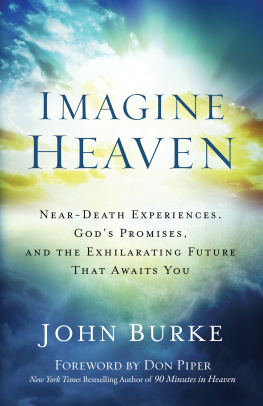Contents
W hen I became an Episcopal priest in 1965, I knew I would have to deal with death. I had no idea, however, that I would hear so many accounts from people who came back from it. Over the last forty years, I have listened to the stories of more than two hundred people who experienced life on the other side, and I have researched many more. This book analyzes those events and my reactions to them. There are dozens of books and compilations of near-death accounts by the people who had the experience. There is no need for me to add to that collection. Nor is there a need for me to explore the scientific aspects of this phenomenon. Several well-qualified medical doctors have already done this, particularly Raymond A. Moody Jr., Elisabeth Kbler-Ross, Melvin Morse, Pim van Lommel, John Audette, and Jeffrey Long, most of whom I reference and cite in the following pages.
I write strictly as a pastor, one who is deeply privileged to have heard so many accounts. As a clergyman, I am concerned that most people who have had the experience are reluctant to talk about it. This should not be the case. These stories should be shouted from the rooftops. The spiritual aspects of these accounts fascinate me. They follow so closely the understanding I have of the loving nature of God as shown in the person of Jesus of Nazareth in the New Testament.
If you want to know what heaven is like or what God has in store for us when we die, this is the book for you. Within these pages, I examine in full several near-death experiences. In doing so, I trace the similarities and patterns found in each account and highlight the pastoral and theological implications of these experiences. For far too long pastors, clergy, and lay Christians around the world have dismissed these experiences as meaningless flights of fancy that run counter to our faith. My argument is the exact opposite. I believe these experiences are central to our Christian faith. Each account verifies for the Christian community Gods love and promise of eternal life in a literal heaven. As Christians, we should celebrate these near-death accounts as living testaments of this promise.
In addition to wanting to share these stories, I have other goals for this book. First, I want to comfort people who are curious, perhaps worried, about their eternal destiny. As a pastor, I get questions about this occasionally, when people are facing the reality of their own death. Is it a demise or a development? Final event or future unfolding? What about hell? People who are loving, as Jesus commanded, will find great news in these accounts. People who live lives of hate, anger, revenge, control, cruelty, and meanness toward others should read the distressing accounts carefully.
Second, I want to challenge believers and nonbelievers alike. We all need for those who have had their own near-death experience to share their stories with the world. (If you are a returnee who has experienced Gods love face-to-face, dont be ashamed to spread the word!) And I want to encourage Christians, and members of the clergy in particular, to accept these experiences as gifts from God, as part of the gospel, and incorporate them and their insights into their ministries. We must communicate to people facing death the deeply comforting, faith-affirming facts of the near-death accounts as well as help those who have undergone a near-death experience grapple with this life-changing event.
Finally, I want to address those who feel that either their understanding of doctrine or what the Bible teaches forces them to reject these accounts of visits to heaven. I ask you to listen to the people who have interacted face-to-face with God or one of two kinds of spiritual beings, either one of light or one of darkness. Too many Christians discount these narratives because they contradict what they have been taught and thus believe about God. To a person, returnees tell us about the forgiving nature of God, regardless of a persons faith group, lifestyle, sexual preference, or lot in life. I challenge you to compare these insights to your own strongly held beliefs about Gods judgmental view of humanity. I see a serious disconnect between what some faith groups teach and preach about Godfor example, that he is angry, violent, and narrowon the one hand, and what returnees tell us: that God is loving, accepting, and full of grace.
One persons near-death experience is that individuals own treasured event. But there are too many amazing similarities between these experiences for them to be mere coincidence. At the same time, there are also some interesting differences in these accounts, which give us even more intriguing insights into the will and nature of God.
People with differing cultural or religious backgrounds and circumstances show us a broader spectrum of human existence and Gods response to the varying situations. I see many important implications in what people have shared with me.
Based on my decades of experience in dealing personally and pastorally with many dozens of returnees, I am left with only one viable conclusion: near-death accounts are real. We need to accept them as such. Often a life change will occurboth for the one who tells it and the one who hears it. Such a major change of outlook on life happened to me.
This is not a new gospel. It is the same gospel: God loves us, forgives us, redeems us, and saves us for eternal life. We are still being offered good news from heaven, if we have ears to hear.
The Rev. John W. Price
I do not have the typical background of a clergyman. Growing up, I was taught to respect the rational traditions of science and technology. All the men in our extended family were engineers, scientists, or technicians. Although I was raised in the Episcopal Church, even serving as an acolyte and singing in the choir, deep faith never came naturally to me. My family advised and prepared me for a life as an engineer. They wanted me to work in and perhaps later manage the highly successful engineering and manufacturing business my namesake, Uncle John, had run for decades. Like all his nephews, I worked summers at the plant. I was the only one who returned year after year. I discovered I was good at the engineering concepts, but realized this was not what I wanted to do with my life.
As a freshman at the University of Texas, I abandoned engineering and switched to history and psychology to prepare for ministry in the Episcopal Church. But although I became a pastor, I nonetheless remained as close to a rational materialist as a clergyman could. Despite my new career, I had no clear understanding of heaven, lifes great mystery. Back then, I am now embarrassed to admit, I never fully believed in life after death.
In the middle of my seminary years, doctors discovered that my mother had lung cancer, and they kept her alive for six months. Every young childs dread is that his or her parents will die. At the time of my mothers death, I was studying at the Virginia Theological Seminary in Alexandria. The seminary community was an enormous help to me during the most difficult time I had faced to date.
But there was no spirituality, as Ive come to understand it, in the comfort they gave me, nor in the classroom instruction. It would be another decade before the discussion of spirituality began. Back then, I wasnt even sure I would have understood the meaning of the word. If we had discussed spirituality, we might have drifted over into the nature of life after death, but heaven was only referred to obliquely. In our discussions, we were principally interested in social justice and the interpretation of scripture.
At one point, I tried in a term paper to discuss the concept of the love of God and the importance of it for life in the church. The professor gave me a C with the comment, I do not get this love business. The lesson I took home was not to experiment in an academic setting. I realized I would not be able to explore the issue until I had my own pulpit.

